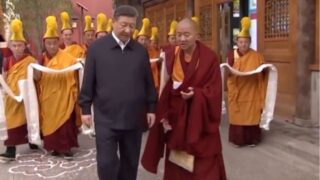Introductory speech by Massimo Introvigne, editor-in-chief of Bitter Winter, at the plenary discussion in the Lithuanian Parliament on Lithuania’s strategy for Asia, June 18, 2020.
by Massimo Introvigne


I hope your debate about Lithuania’s relationship with Asia will be helped by a scholar’s contribution on human rights in China.
As French Sinologist Alice Ekman demonstrated in her recent book “Rouge Vif,” it is not true that China has “abandoned” Communism. Although elements of Imperial China are also used in the official rhetoric, they are interpreted through Marxist lenses. With Xi Jinping, ideology is at the center of the Chinese Communist Party (CCP) project even more than before.
Xi Jinping is part of a generation that spent years studying why the Soviet Union collapsed, and how the CCP can avoid repeating the same mistakes. They came to four main conclusions. First, Soviet Union started collapsing well before Gorbachev, with what Xi has called the “stupid” idea of criticizing Stalin. We “should never forget the teachings of Stalin,” he declared.
Second, the “strike hard” strategy. In May 1989, while students were protesting in Tiananmen Square, Gorbachev visited Beijing and recommended moderation. In the internal CCP history manuals, Deng Xiaoping’s decision not to follow that suggestion and send the Army to “strike hard,” killing some 10,000 students, is hailed as the glorious move that saved the regime.
Third,“striking hard” at all those included in what Mao called “targeted categories,” including devotees of non-authorized religions, political dissidents, and minorities such as Tibetans and Uyghurs, is one of the pillars of repression. The other is the “management of public stability” through “home reeducation,” use of economic punishments and rewards, and 24/7 surveillance.
Mao already theorized that all Chinese citizens should be under permanent surveillance. But he lacked the technology Xi Jinping now has: 300 million surveillance cameras, facial recognition, spyware all Chinese are compelled to install on their smartphones, and artificial intelligence – plus “block captains” who visit all homes and supplement technology with legwork.
According to the CCP’s textbooks, one main reason why Communism collapsed in Eastern Europe was that religion was allowed to persist and flourish (Poland and Lithuania are often quoted as “bad” examples). Xi Jinping launched the worst crackdown on religion since the Cultural Revolution, destroying tens of thousands of churches, mosques, and temples, including some “authorized” and pro-government.
In some temples, statues of Mao and other Communist leaders replaced the Buddhas and Bodhisattvas.
Millions of Uyghurs, ethnic Kazakhs, and Tibetans were sent to “transformation through education” camps. Hundreds of thousands of members of fast-growing new movements regarded as especially dangerous for the CCP, primarily Falun Gong and The Church of Almighty God (currently the most persecuted movement in China) were arrested, and hundreds of them killed.
Fourth, the CCP believes that the Soviet Union failed because its propaganda had become ineffective and its presence in international institutions not strong enough. The CCP uses the incredible number of 10.5 million trolls to continuously post propaganda on international social media. Each Chinese university should supply a quota of “volunteers for civilizing the Internet” (see poster), able to post in foreign languages.
China also managed to elect Chinese as the current heads of the U.N.’s Food and Agriculture Organization (FAO), the International Telecommunication Union (ITU), the International Civil Aviation Organization (ICAO), the United Nations Industrial Development Organization (UNIDO), and even as high bureaucrats in the Human Rights Council (HRC). The World Health Organization (WHO) was shaped by the ten years (2007-2017) when it had a Chinese director-general, and she was succeeded by the current pro-Chinese Ethiopian DG.
Xi Jinping has expressed his confidence that Chinese international activism (and economic blackmail) will defuse any foreign criticism of present and future moves about Hong Kong and Taiwan. The next few months and years will tell us whether his strategy will succeed. It will very much depend on how democratic countries will react. Thank you.










